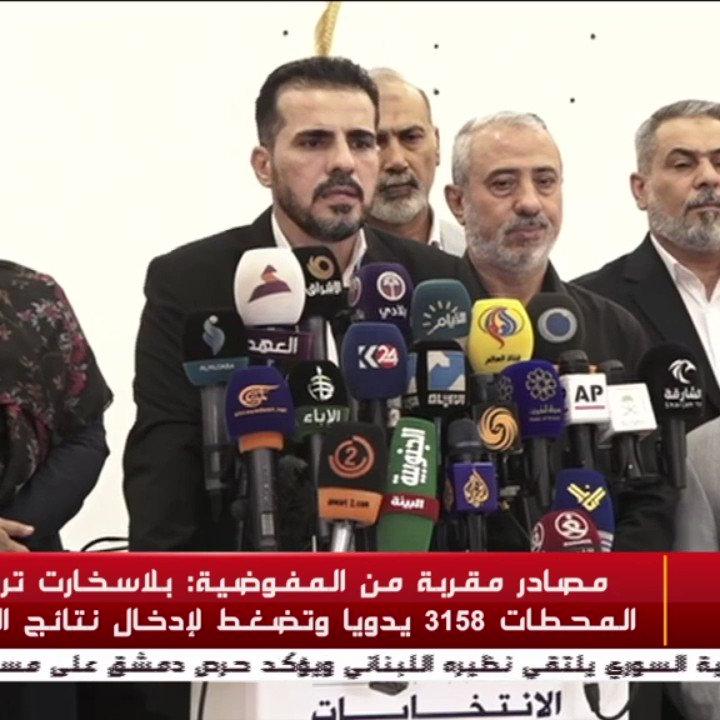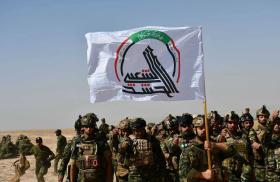
Hossein Moanes Sparks Angry Words Between Kataib Hezbollah and Asaib Ahl al-Haq

The senior KH member now leads a new political movement that is competing with other Iran-backed militia factions for votes in the coming election.
On September 11, Hossein Moanes, the head of Kataib Hezbollah (KH) affiliate group Harakat Hoquq (The Rights Movement), gave an interview to Lebanese television outlet al-Mayadeen, where he presented a long list of problems that have gripped Iraq in recent years (Figure 1). When asked who is responsible for these problems, he replied “the political system and the political blocs, each according to its participation [in the political process].” Given that one of the major players in Iraq's political scene is the Fatah Alliance—a bloc dominated by Iran-backed factions the Badr Organization and Asaib Ahl al-Haq (AAH)—Moanes was essentially criticizing his fellow muqawama (resistance) groups.
Even these blunt words were a toned-down version of the rebukes he has been delivering to other muqawama political parties since he established his own movement. In his first television appearance as head of Harakat Hoquq in late July, he presented himself and his movement as an alternative to other muqawama parties, telling Kataib Sayyid al-Shuhada’s iNEWS TV, “There is a big political vacuum and disappointment toward our people...I established this movement to address part of this frustration” (Figure 2).
His language was even stronger in a speech at the launch of Hoquq’s election campaign on August 4, where he harshly rebuked all political parties that have taken part in Iraq's parliament and government: “The corruption is a field for unrivaled national unity...as all groups with various religious, racial, and ethnic identity participated in it...All [the political groups] have taken part in corruption...and the time for change has come...It is time for a group outside this game to step forward to manage the country, [a group] outside these alliances that on many occasions compromised the rights, the national decision, and dignity and sovereignty” (Figure 3).
Backlash from Other Muqawama Elements
This narrative did not go down well with other muqawama groups. Two days after the August 4 speech, AAH military spokesman Jawad al-Talibawi excoriated KH commander and Popular Mobilization Forces (PMF) chief of staff Abu Fadak al-Muhammadawi—both a rare move and an indirect response to the Moanes speech and the political dealmaking carried out by his parent organization, KH. In a twitter post, Talibawi criticized Abu Fadak and questioned his integrity for appointing the son of Defense Minister Juma Inad as commander of a Sunni PMF unit: "Being the PMF’s chief of staff and a successor for the martyr leader Abu Mahdi al-Muhandis, you have a bigger responsibility to make the right decisions and avoid appeasing [others] when it’s at the cost of the blood of the martyrs, or even worse to the benefit of enemies of the PMF. Let me be frank with you! Your decision to appoint the son of someone who accused the holy PMF of having a secondary role in liberating Iraq from the Islamic State is a decision that can [only] be taken by a politician who wants to appease the corrupt at the cost of the interests of the nation” (Figure 4).
Talibawi was referring to the fact that when the PMF besieged Baghdad’s International Zone after the May 26 arrest of commander Qasim Muslih, Inad criticized the militias and downplayed their role in defeating the Islamic State. This infuriated the muqawama and made Inad their enemy du jour. Talibawi's comments were notable for being delivered publicly rather than through internal muqawama channels, reflecting sharp political competition before the elections.
KH Tries to Mend Fences
Afterward, KH felt compelled to mend the rift. In a statement published by its website on August 8 and widely shared by muqawama media, the group called on all political candidates to "promote their plans without transgressing others, especially those who have a right over us, and we believe that keeping them is a religious and moral duty" (Figure 5).
Since then, Moanes has toned down his language, but his strategy remains focused on setting his movement apart from other muqawama groups and presenting it as a clear alternative in order win votes from muqawama supporters.
Many experts believe that Moanes is actually Abu Ali al-Askari, the notorious KH security spokesman. He has always denied this connection, but perhaps only to separate his military identity from his political brand—an understandable approach given the type of statements that have been attributed to Askari (e.g., in December 2020, he threatened to cut Prime Minister Kadhimi’s ears “the same way ears of the goats are cut”; see Figure 6). He is now trying to present himself as a politician who has left his militia, but all evidence indicates that he is still very much a senior member of KH, a U.S.-designated terrorist group.









